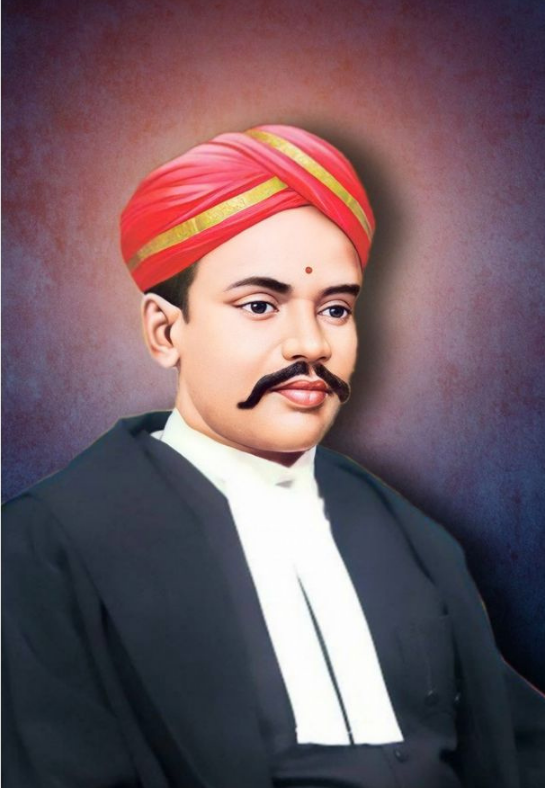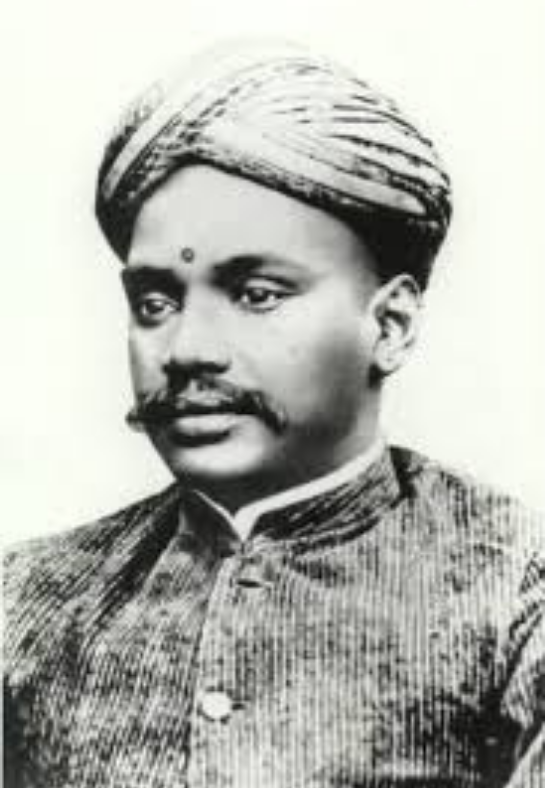Review of Dr. J.S. Rajkumar’s Biography on
V.O. Chidambaram Pillai
By Usha Nesamoney
Dr. J.S. Rajkumar’s biography of V.O. Chidambaram Pillai is a compelling effort to shed light on the life and legacy of a multifaceted yet underappreciated patriot from South India. Through this work, Dr. Rajkumar portrays VOC Pillai not merely as a historical figure, but as an embodiment of resilience, virtue, and purpose. He argues that while VOC’s life might have followed a tragic arc—from riches to rags—it was also marked by dignity, discipline, and an unwavering commitment to higher ideals. As the author notes
“VOC’s life did not end in material triumph, but it was nonetheless a life worth knowing—one that powerfully illustrates that a virtuous and purpose-driven existence is its own reward.”

Usha Nesamoney
Usha Nesamoney is a Management and Education Consultant, Entrepreneur, Philanthropist, and Parent. She serves on Stanford University’s Undergraduate Cabinet and is a passionate advocate for education and mental health, especially among youth.
Usha is the President of the Cantabile Youth Singers of Silicon Valley Board and serves on Stanford Health Care’s Community Council, promoting healthcare access across diverse communities. She is a Trustee and West Coast Board Member of the American India Foundation, and has held board roles at Global Citizen Year and Yale School of Management’s West Coast Advisory Board.
Elected as the President Elect of the Stanford Parents Club—representing over 10,000 members—she also volunteers with the Stanford Parent and Family Partners’ Committee, and contributes to undergraduate and MBA admissions as a reader.
Usha’s professional background includes roles at Charles Schwab & Co., Booz Allen & Hamilton, and Price Waterhouse. She holds a BA from the University of Delhi and an MBA from the Yale School of Management.
She resides in Atherton, California, with her husband Diaz and their children. Her interests include podcasts, gardening, and yoga.
Reading this work evoked in me Ralph Waldo Emerson’s timeless insight:
“The purpose of life is not to be happy. It is to be useful, to be honorable, to be compassionate, to have it make some difference that you have lived and lived well.”
This quote resonates profoundly with VOC’s journey, as captured in these pages.
Spanning 538 pages and including a foreword by Prime Minister Narendra Modi, the book is structured into 41 chapters and offers a vivid, exhaustive portrayal of Vallinayagan Olaganathan Chidambaram Pillai—more commonly known as VOC. As I immersed myself in this dense and detailed volume, I was struck by the richness of its historical content, reaching as far back as the 17th century. Dr. Rajkumar intricately weaves Tamil literary references, especially from the Tirukkural, with his own reflections on the motivations and actions that shaped VOC’s life. As Dr Rajkumar notes
“He was manifest in all the graces, a la the prescribed norms of the immortal Thirukkural, and lived his life as a perfect Tamil warrior would, with grace, coupled with a Dharmic approach to every act of his.”
The biography explores VOC’s daily pursuits and passions, revealing a man of extraordinary versatility and depth. Whether mastering classical dance, chess, Silambam (staff fighting), or even stilt-walking, VOC is portrayed as a true polymath. His inspirations, often linked to specific Kural couplets, demonstrate how Tamil philosophy informed his every endeavor. In capturing these nuances, the book also reflects the intellectual and cultural richness of the author himself. The parallels between the author’s life and his subject also adds to the depth of the book offering a window into why the author calls the book an emotional biography.
At the heart of this narrative lies a compelling sense of purpose: Dr. Rajkumar is deeply committed to ensuring that future generations understand and value the mindset, philosophy, and sacrifices of unsung heroes like V.O. Chidambaram Pillai (VOC). While Dr. Rajkumar has previously written about prominent figures such as Bhagat Singh and Chhatrapati Shivaji, this biography is uniquely dedicated to VOC—an under-recognized figure whose contributions had a profound impact across multiple dimensions.
Through this work, Dr. Rajkumar not only sheds light on VOC’s legacy but also emphasizes the importance of embracing South Indian history and literature. At the same time, he underscores the enduring injustices imposed by British colonial rule and the exploitative practices of the East India Company.
The biography doesn’t shy away from presenting the full spectrum of human nature—from loyalty and valor to greed, betrayal and cowardice. While the book can be dense at times, its depth and detail are ultimately enlightening. Each chapter offers something of value, making the experience intellectually rewarding and emotionally resonant.
The 41 chapters are arranged to mirror the life journey of VOC Pillai, beginning with Kural 596—a verse that encapsulates the guiding principle of his life: “One must constantly strive to achieve the highest target within his reach.” Each chapter starts with a carefully chosen Kural presented in Tamil, accompanied by its meaning, grammatical insights, underlying principles, and the author’s personal reflections.

Far more than a mere chronology of events, each chapter serves as a rich tapestry of history, culture, community, leadership and values. This meticulously researched and compelling biography is best approached one chapter at a time, ideally followed by thoughtful discussion. Such a deliberate pace allows readers to fully absorb the depth and nuance of the narrative, and to reflect on its wider historical and cultural significance.
Dr. RajKumar begins the first chapter by grounding the reader with Kural 596 ( listed above), underscoring VOC’s unshakeable work ethic and then delves into VOC Pillai’s origins—his birthplace, the meaning behind his name, and the social prejudices that sought to deny him respect. The chapter then continues into the multifaceted nature of his personality, the foundational support of his father, and concludes with the type of education that has been imparted over the centuries to Indians as well as to VOC. As the author notes “Stylish uniforms, socks and shoes are not central to education. But understanding the principles of Dharma, that is central”.

Chapter 3, titled “A forgotten tribe, and a tectonic impact on Tamil Nadu politics” opens with Kural 659, which conveys a powerful message: A king must never extract wealth from his people in a way that causes them hardship. The author highlights how V.O. Chidambaram Pillai (VOC) lived by this principle, consistently giving back to his community rather than taking from it. The author then focuses on the Vellalar community, which the author estimates constitutes roughly 20% of Tamil Nadu’s population. Known for being well-educated and influential, the Vellalars have established and managed key institutions such as hospitals and colleges. Today, they are increasingly vocal in political spheres—a legacy partly shaped by leaders like VOC, who once stood as a prominent figurehead of the community.
Chapter 4 opens with Kural 978, which underscores the idea that true greatness is always accompanied by humility. The author observes that VOC exemplified this virtue throughout his life. The chapter delves into the social injustices of the time, painting a vivid picture of the inequalities that stirred VOC’s conscience and motivated his pursuit of a career in law. His humility, paired with a fierce sense of justice, made him a powerful advocate for the oppressed.
Subsequent chapters chronicle VOC’s relationships with towering contemporaries like Bal Gangadhar Tilak, Subramania Siva, and Subramania Bharathi, drawing from VOC’s own writings. Dr. Rajkumar offers a wide-ranging perspective on the political climate of the time, critically engaging with Gandhian philosophy, which both he and VOC viewed as having limitations, especially regarding its impact on Hindus and Tamils. These chapters are rich with global context, referencing figures like Martin Luther King and the Japan-Russo war, and framing VOC and his allies as part of the “Radical Congress group.” These chapters underscore how historical accounts have often been shaped by one-sided narratives. While Gandhi is widely revered across the world, this book—and increasingly, contemporary Indian media—offers an alternative perspective that is both thought-provoking and necessary. The depth of historical insight and nuanced perspective presented here makes it essential reading for anyone interested in India’s past.

Each chapter sheds light on VOC’s unique thought process, his active engagement, and his close relationships with the three key figures mentioned earlier. In a compelling metaphor, the author likens VOC, Siva, and Bharathi to the Hindu trinity—Brahma, Vishnu, and Shiva—describing them as the Mummoorthies of Tamil Nadu’s resistance.
This chapter on “the story of three poets” is as much a cultural and literary tribute as it is a story of resistance against British rule. It celebrates three great poets and expresses a deep sense of national pride, centered around the powerful legacy of the iconic song “Vande Mataram.” Beyond recounting historical events, the chapter also reflects the author’s own polymathic, patriotic, and philosophical spirit. He writes,
“Pioneers face the wrath of the ignorant.”
“Being a hot-blooded Indian, I must trace the history of this… Through this song—and through our national anthem that resonates in the hearts of over a billion Indians—Tagore, Bankim Chandra Chatterjee, and Bharathi continue to live on.”
Chapters on VOC’s Swadeshi Steam Navigation Company (SSNC) reveal his entrepreneurial genius and the challenges he faced against the unethical tactics of the British, particularly the BISN under the East India Company. The author brilliantly intertwines economic insight, human greed, patriotism, and ultimate sacrifice. VOC’s journey—from riches to rags—demonstrates unwavering integrity even in the face of loss.
Following this, the biography shifts focus to VOC’s role in organized resistance—strikes, riots, and civil unrest. His absolute commitment to his ideals is inspiring, though the betrayal he faced from fellow Indians adds a bitter note.
The chapter on gratitude reflects the deep emotional bond between VOC, the author, and Tamil culture. Dr. Rajkumar writes:
“Just think about it. A man who was once one of the richest in his district. Smashed to his knees, and down to his last few coins. Still showing grace and gratitude in every single move that he made. That is the true greatness of VOC Pillai.”

In the closing chapters, the biography turns philosophical. VOC’s contributions to Saiva Siddhanta and his interpretations of the ThiruKural and Sivagnanabodham are discussed at length. Dr. Rajkumar masterfully deciphers VOC’s intellectual depth and spiritual insights. He writes:
“This crystal-clear observation of VOC, if carried home in the minds and hearts of Hindus everywhere, eclipses the poetry, meter, rhyme, syntax, et cetera of this magnificent piece of work.”
He adds that
“My prayers to the Almighty are that all Tamil people should read, and listen to the marvels of the Kural, and try to live up to the principles expounded in the same, in order to live a full, rich and evolved life.”
The final pages recount VOC’s later years—conflicted, uncertain, yet deeply reflective. Dr. Rajkumar compares VOC to other imprisoned patriots whose prison years birthed literary masterpieces that have outlived their creators.
The biography ends with an impassioned call for VOC Pillai to be awarded India’s highest civilian honor, the Bharat Ratna. Dr. Rajkumar writes:

“This man—Chidambaram Pillai:
A great soul.
A polymath, a true multi-faceted genius.
A fighter for freedom.
The first from the Madras Presidency punished for sedition.
The only man sentenced to forty years imprisonment by the British.
The first to challenge British maritime supremacy by launching a navigation company.
The leader and financier of the first successful labor strike.
One of the first to declare that the Vedanta of the North and the Siddhanta of the South articulated the same principles.
This man deserves to be immortalized with the highest civilian honor of the country: The Bharat Ratna.”
– JAI HIND


